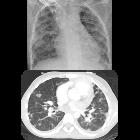Sepsis
Sepsis is a syndrome, with a poorly understood pathogenesis, characterized clinically by a recognized set of signs and symptoms in someone with presumed infection.
Terminology
Sepsis was defined by The Third International Consensus Definitions for Sepsis and Septic Shock (Sepsis-3) in 2016 as "life-threatening organ dysfunction caused by a dysregulated host response to infection" .
Septic shock forms a subpopulation of the sepsis cohort, manifesting as synchronous severe cardiovascular, cellular and metabolic dysfunctions, linked to an elevated risk of mortality, versus sepsis alone .
Establishing the diagnosis of septic shock in adult patients requires that despite satisfactory fluid resuscitation there is:
- hypotension, necessitating pressors to achieve an average systolic blood pressure of ≥65 mmHg
and
- serum lactate >2 mmol/L
NB The separate condition "severe sepsis" has now been abandoned. "Septicemia" is generally not felt to be helpful any longer due to it being too narrow in scope.
Siehe auch:
- septische Embolie Lunge
- Septische Arthritis
- septische Embolie
- Lemierre-Syndrom
- multifocal osteomyelitis following septicemia
- septische Embolie Gehirn
- meningococcal septicaemia
und weiter:

 Assoziationen und Differentialdiagnosen zu septicaemia:
Assoziationen und Differentialdiagnosen zu septicaemia:



